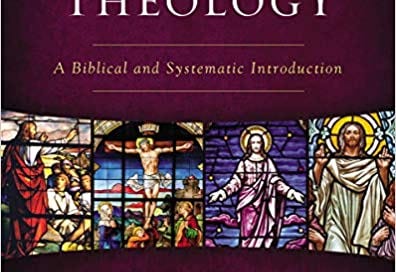Book #12 was Evangelical Theology, what I regard as my singularly greatest contribution to Christian thought, and my personal favourite out of all my books.
I’d always been interested in the intersection between biblical studies and systematic theology. I also found myself teaching across both disciplines. In search of a text to assign, there are several good textbooks out there written by evangelicals and for evangelicals. However, I could not find a textbook that made the evangel, i.e., the gospel, the leitmotif, of the volume. Soon such a book was no longer one that I was looking for, but one I wanted to write. I wanted to write a volume of systematic theology that bound the gospel the centre, boundary, and integrating point for the entire theological project. Something that was not just evangelical-ish, but truly and consistently evangelical. So that is what I set out to do!
The volume had several distinctive features:
I deploy my knowledge of biblical studies in a fairly fruitful way, so it is very biblical. In fact, some critics say it’s not really a systematic theology, more like a biblical theology.
For me prolegomena, the first step of theology, is defining the gospel, so that is what you get in the intro.
The second major chapter is on eschatology because all of theology exists between the now-and-the-not-yet.
I interject some of my own humour across the volume because theology should not be dry and cerebral, but fun, vitalizing, and enjoyable. Some consider this humourous effort to be juvenile and inappropriate, others find it snortingly hillarious.
One problem I faced is that the word “evangelical” has a certain history and a certain cultural texture in certain parts of the world (cough, cough, USA, cough, cough). I did consider changing “evangelical” to “Reformational Catholicism,” but that would be a marketing disaster, plus, I believe “evangelical” is a good word if understood in the proper historical sense (a unity of puritan and pietist movement) and in a theological sense (a way of life that prizes and promotes the gospel). So I’m keeping the word “evangelical,” I’ll explain what I mean by it, and as long as the gospel is good news about Jesus you can prise it from my cold, dead, hands.
But after I wrote the first edition certain deficiencies became honest. The sections on the Holy Spirit and Anthropology were pretty light, boring, and mundane. Also, the bibliography was, shall we say, overly white, male, and Calvinistic. Plus, I had a few more jokes I needed to add. So, with Zondervan’s pleasure, I updates the volume into the second edition, including:
More on postmodernism, sources of theology, and how doctrines develop.
A bigger and buffed-up section on the Trinity.
More on humanity, like what is “human identity” and how disability helps us think about the image of God.
More on the person and work of the Holy Spirit.
More on the church, like multi-site churches.
More interaction with female and majority world scholars, more especially from Wesleyans and Arminians, lots from Asian theologians.
The council of Nicaea explained through a rap battle.
The book continues to do well, it has had a good take up in colleges and seminaries around the world. It is also available as an enhanced textbook, which is an ebook and video lectures integrated together! Many have found the audio book useful too!
When people ask what’s the # 1 book to get the full Mike Bird experience - not every day, but from time to time - I always recommend my evangelical theology!
Here’s a video I did as part of the promo of the first edition.





I have not read your book, but because of highlighting it here I will get the new edition. Thanks for writing this.
The reality is that the term "evangelical" or being recognized as an "evangelical" is very difficult today. I remain Protestant and did my Th.D. and STM on Luther's theology - so that is a touchstone for me. That being said, I find it difficult to adhere to something like the "5 Distinguishing Marks of Evangelicalism" as elaborated on within the Gospel Coalition's web site. I don't need to go into detail here, but I think the rich traditions across the social and global spectrum has called into question some of those "distinguishing" marks. Perhaps you could even say that evangelicalism is morphing - is that even possible? Perhaps it is no longer evangelicalism, but something new.
I'm wrestling with this right now :)
I have read this marvelous book! It is in my mind, your crowning achievement! It is my go-to book in matters of theology! Concise, yet deep, thought provoking yet humor sprinkled throughout, builds on the thoughts of the theological giants of the past, yet introduces fresh and even new ways of looking at this gospel-centric theology. Well done, my friend!!